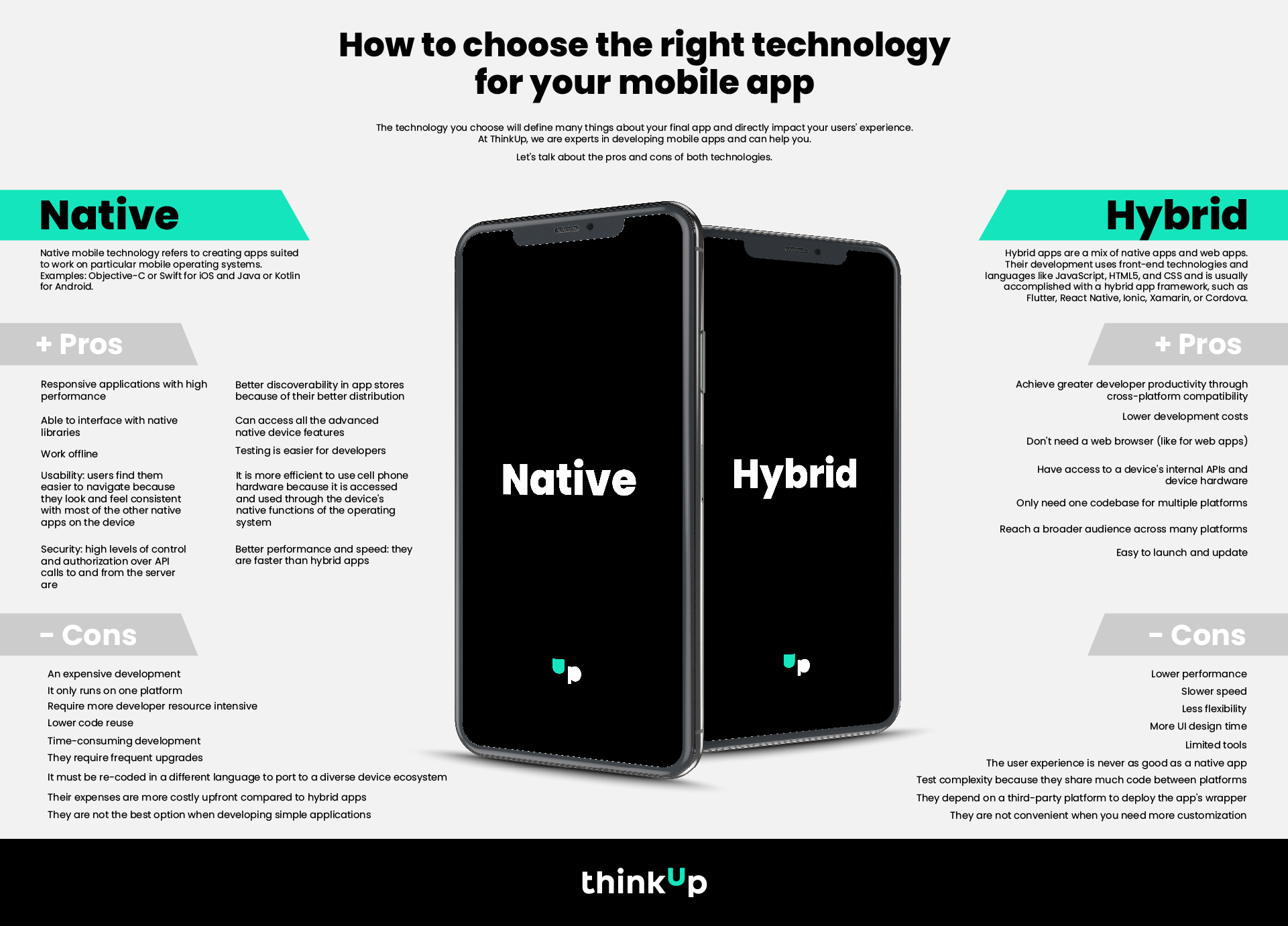Do you need to develop a mobile app? Don’t know whether to choose native or hybrid technology? Is price the only difference, or are there more aspects to consider?
Maybe it sounds like a simple decision, but it is not quite like that. The technology you choose will define many things about your final app, and it will directly impact your users’ experience. And at this point, you can’t fail.
To go native or to go hybrid: that’s the question
There’s an ongoing debate raging about this around mobile app development.
At ThinkUp, we are experts in developing mobile apps. Every time we are deciding what technology to use for each project. Believe me when I say we have learned a lot about this.
This article will share the pros and cons of both technologies and give you some practical tips that may help you choose native or hybrid for your next mobile application.
When choosing, here’s our first recommendation, always focus on your users and give them the best user experience. No one has time for bad experiences. The success of your app depends on this.
So, let’s talk in detail about native and hybrid. Are you ready?
Native apps pros and cons
Native mobile technology refers to creating apps suited to work on particular mobile operating systems. The more common native programming languages are Objective-C or Swift for iOS and Java or Kotlin for Android.
When you choose native technology, these are the advantages:
Native mobile apps pros
- Better performance and speed: they are faster than hybrid apps.
- The use of cell phone hardware is more efficient because it is accessed and used through the device’s native functions of the selected operating system.
- Intuitive use: these apps usually look and feel consistent with most of the other native apps on the device. So users find them easier to navigate and use.
- More security: their levels of control and authorization over API calls to and from the server are better.
- Responsive applications with high performance
- Able to interface with native libraries
- Work offline: you can use them even if you are not online (it happens often, trust me).
- Better user experience: because of all the previous advantages, and besides, they quickly access and utilize the built-in capabilities of the user’s device, such as address book, camera, or GPS.
- Testing for developers is easier: test more thoroughly.
- Have access to all the advanced native device features.
- Their better distribution in app stores improves their discoverability.
But, of course, you have some cons too:
Native mobile apps cons
- An expensive development.
- It only runs on one platform.
- Require more developer resource intensive.
- Lower code reuse.
- Time-consuming development.
- They require frequent upgrades.
- It must be re-coded in a different language to port to a diverse device ecosystem.
- Their expenses are more costly upfront compared to hybrid apps.
- They are not the best option when developing simple applications.
Hybrid application pros and cons
Now it’s time to talk about hybrid technology. Hybrid apps are a mix of native apps and web apps. That’s why many misdescribed them as websites packaged into a native wrapper.
Hybrid app development uses front-end technologies and languages like JavaScript, HTML5, and CSS. They are usually accomplished with a hybrid app framework, such as Flutter, React Native, Ionic, Xamarin, or Cordova.
Let’s look at them.
Let’s begin with the positive side and talk about this technology’s advantages.
Hybrid mobile apps pros
- Achieve greater developer productivity through cross-platform compatibility.
- Lower development costs because they are easier to build, take less development time, and need only one codebase across multiple platforms.
- They don’t need a web browser like for web apps.
- Have access to a device’s internal APIs and device hardware.
- They only need one codebase for multiple platforms.
- Reach a broader audience across many platforms
- Easy to launch and update
On the other hand, we have the disadvantages:
Hybrid mobile apps cons
- The user experience is never as good as a native app, even the most brilliant user experience architect.
- Lower performance.
- Slower speed.
- Less flexibility.
- More UI design time.
- Limited tools.
- Test complexity: they share a lot of code between platforms, and some of that code is often native to take advantage of the underlying hardware.
- They depend on a third-party platform to deploy the app’s wrapper.
- They are not convenient when you need more customization. In this case, native apps are more efficient in reducing costs.
4 tips for selecting the right technology for your app
I don’t want to make you feel sad, but we’ll not tell you the answer. However, we may help with these tips you should consider when making your decision:
- Product lifetime: if you plan to develop a mobile application for the long term (e.g., mobile banking), native development frameworks and tools are more stable.
- Performance and user experience: this should be one of your top priorities. No matter which technology you choose, your users’ experiences must be great because it is the key to an application’s success. According to this, native assure the best user experience but needs more time for development. Conversely, hybrid app’s user experience is lower, but development time is shorter than native.
- Access to hardware resources: native is the option when the app requires complete access to all the target device’s resources and services. If not, hybrid is a good option too.
- UI/UX design: (in general) native apps deliver more stunning visuals and an outstanding UX, but hybrid apps can do a great job too.
So, the final choice is…
When the moment of truth comes, you have to decide. Every client has their reasons when choosing one way or another, but you have to clarify its impact on the final product.
Taking all this into account is vital for delivering the promised results and giving the users the best experience they can get according to the clients’ possibilities (e.g., budget, time, etcetera).
If you want to develop an app for your business, we can help you. Together we’ll find the best option for you and your app’ users.
Contact us for further information. We are your ideal IT Partner.







